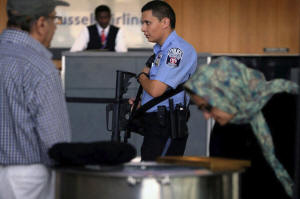|
The
current ban, enacted in March and set to expire on Sunday
evening, extended to travelers from Iran, Libya, Somalia, Syria
and Yemen. The new order could fall short of a complete ban,
instead tailoring travel restrictions on a country-by-country
basis.
Trump received a set of policy recommendations on Friday from
acting Secretary of Homeland Security Elaine Duke and was
briefed on the matter by other administration officials,
including Attorney General Jeff Sessions and Secretary of State
Rex Tillerson, a White House aide said.
Trump offered little insight on Sunday about what might come
next, telling reporters only: "The travel ban: The tougher, the
better."
As of Friday, the president had not made a final decision as to
the contents of the new order and which nations would be
affected, leaving open the possibility the list could be
expanded.
Rather than a total ban on entry to the United States, the
proposed restrictions would differ by nation, based on
cooperation with American security mandates, the threat the
United States believes each country presents and other
variables, Miles Taylor, an aide to Duke, said on Friday.
After the Sept. 15 bombing attack on a London train, Trump wrote
on Twitter that the new ban "should be far larger, tougher and
more specific - but stupidly, that would not be politically
correct."
The expiring ban blocked entry into the United States by people
from the six countries for 90 days and locked out most aspiring
refugees for 120 days to give Trumpís administration time to
conduct a worldwide review of U.S. vetting procedures for
foreign visitors.
Critics have accused the Republican president of discriminating
against Muslims in violation of constitutional guarantees of
religious liberty and equal protection under the law, breaking
existing U.S. immigration law and stoking religious hatred.
Some federal courts blocked the ban, but the U.S. Supreme Court
allowed it to take effect in June with some restrictions.
The Supreme Court will hear arguments on Oct. 10 on whether the
current ban discriminates against Muslims in violation of the
U.S. Constitution, as lower courts previously ruled.
(Additional reporting by Yeganeh Torbati, Lawrence Hurley and
Phil Stewart in Washington; Editing by Lisa Von Ahn and Peter
Cooney)
[© 2017 Thomson Reuters. All rights
reserved.] Copyright 2017 Reuters. All rights reserved. This material may not be published,
broadcast, rewritten or redistributed.
 |
|






